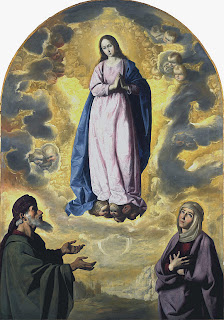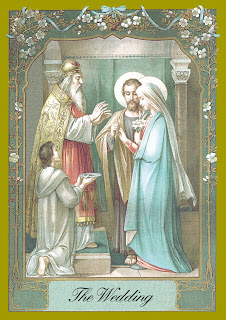
The Immaculate Conception with Saint Joachim and Saint Anne Circa 1638 - 1640, Francisco de Zurbarán
The Virgin Mary appears on a pedestal of cherubs' heads above a crescent moon, bathed in golden light. The figures below are her parents, Saints Joachim and Anne. The subject of the Immaculate Conception refers to the Virgin's own miraculous conception in her mother Anne's womb, not to the conception of Christ. It was a popular subject in Seville, but the inclusion of the Virgin's parents is unusual. Since Saints Joachim and Anna were particularly venerated by Carthusian monks this painting may have been made for a Carthusian monastery. There is, however, no other evidence to confirm this.Source: The National Gallery of Art
The following is from St. Michael Center for the Blessed Virgin Mary. Please be sure to visit their site for more prayers, novenas, etc.
On December 8, the Catholic church celebrates the Solemnity of Immaculate Conception of Mary- the patronal feast of the United States. It is one of the few Holy days of obligation on the Church calendar -- that is, all Catholics are obligated to attend Mass on this day. As this feast occurs early in Advent, it is a perfect time to consider Mary and her important role in the celebration of Christmas.
The Immaculate Conception of Mary is a solemn dogma declared by Pope Pius IX in 1854 which proclaimed that Mary was conceived free from the stain of original sin. This privilege of Mary derives from God's having chosen her as Mother of the Savior; thus she received the benefits of salvation in Christ from the very moment of her conception. This great gift to Mary, an ordinary human being just like us, was fitting because she was destined to be Mother of God. The purity and holiness of the Blessed Virgin Mary is a model for all Christians.
"The most Blessed Virgin Mary was, from the first moment of her conception, by a singular grace and privilege of almighty God and by virtue of the merits of Jesus Christ, Savior of the human race, preserved immune from all stain of original sin.”
-Pius IX, Ineffabilis Deus, 1854.







